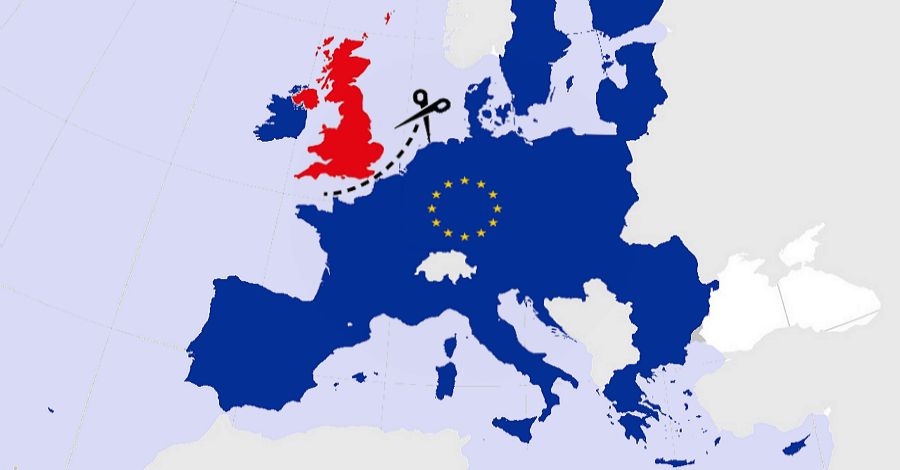WITH THE BREXIT HERE IS THE IDENTITY CARD
OF THE EUROPE OF 27 | |
| With the formalization on Friday of the departure from the United Kingdom, the European Union will lose one of its most powerful and emblematic members. A historic turning point that transforms the face of the EU on many levels. Identity card of this "Europe of 27"
Friday, the United Kingdom will no longer be part of the European Union. After almost 70 years of constant enlargement, the area of political and economic cooperation has lost one of its most powerful members. An unprecedented and historic moment. Going from 28 to 27 member states, the European Union has changed considerably, be it demographic, strategic or economic. Here is the new identity card for the "Europe of 27". 13% fewer inhabitants With 513 million inhabitants in 2019, the European Union ranks third among the most populated areas in the world, far behind the Chinese (1.4 billion) and Indian (1.3 billion) giants By losing the 66 million citizens of the United Kingdom, the European population will fall by 13%, to 447 million inhabitants. Sufficient, however, for the EU to retain its place on the podium, ahead of the Americans (328 million inhabitants). Still the world's leading maritime power With 4.476 million km², Europe has always been a small thumb in terms of area. A size that places it in seventh position in the world. Losing the United Kingdom and its 243,000 km² or 5.5% of the total, the EU will maintain this seventh place with an area of 4.233 million km², just between Australia and India. The loss will be greater for the maritime territory. With 25.6 million km², the European Union is by far the largest maritime power in the world, ahead of the United States (12.2 million). Without the 6.8 million km² of the United Kingdom, it will find itself amputated by a quarter of its maritime space but will retain first place with 18.8 million km². Largely thanks to France and its 10 million km². Second economic power in the world, for now… With a GDP of 18.750 billion dollars in 2018, the European Union is, according to figures from the International Monetary Fund, the second economic power in the world, trailing the United States (20.500 billion). By losing the United Kingdom and its 2.828 billion dollars of GDP, or its second economy, the European Union is cut by 15% of its economic power. With a GDP of around 16 trillion dollars, the EU-27 retains its status as the world's second economic power but finds itself under the threat of China which recorded 13.4 trillion dollars of GDP in 2018 and which enjoys much more dynamic growth than that of the Old Continent. Lost industrial jewels The cradle of the industrial revolution, the United Kingdom now has some of the most powerful companies in the world. Thus the European Union will lose with BP and Shell (however co-managed with the Netherlands), two of the largest oil groups in the world. In the insurance sector, it is an emblematic player, Prudential, founded in 1848, which is leaving the EU, as is the world number three in distribution, Tesco. In the aeronautics sector, it is Rolls-Royce, one of the largest engine manufacturers in the world, which leaves the European Union, as well as the telecommunications giant Vodafone, the world's third largest mobile operator in number of subscribers. Finally, Unilever, the world's fourth largest player in food and body care products, is also one of these companies, even if, like Shell, it is a Dutch-British company. Note however that the loss of these flagships of the industry is above all symbolic because the Brexit agreement will allow these companies to trade with the European Union under favorable conditions. Finance: bye bye la City If it lost its title of first financial place in the world in 2018, passing behind New York, the City of London remains an emblematic place of the sector. Financial services in the UK employ 1.1 million people, almost half of them in London alone. In all, the finance sector brought 132 billion pounds to the British economy in 2018, which represents 6.9% of its GDP, according to data from the British parliament. With Brexit approved, the first financial center of the European Union is now Frankfurt, which ranks 15th globally, followed by Paris (17th), according to the 2019 ranking of the British thinktank Z / Yen. However, it is difficult to assess the impact of the “loss” of the City for the European Union , as many establishments have announced transfers of assets and personnel from the United Kingdom to the continent. But in what proportions? On this, the blur remains total First world tourist destination According to figures from the World Tourism Organization, the European Union alone captures 50% of the sector with 713 million international visitors. The EU can boast of having the two most visited countries in the world, namely France (86.9 million tourists in 2017) and Spain (81.8 million). With 37.7 million visitors, the United Kingdom ranks seventh in the world, but accounts for only 5.3% of European tourism. A figure all the more low as the uncertainty linked to Brexit makes flee the tourists from the treacherous Albion. Attendance thus fell by 7.7% in the second quarter of 2018. |
|
| AbbyShelcore for DayNewsWorld | |
 |
|




